Biota monitoring - Study guides, Class notes & Summaries
Looking for the best study guides, study notes and summaries about Biota monitoring? On this page you'll find 12 study documents about Biota monitoring.
All 12 results
Sort by
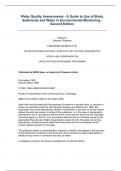
-
Water Quality Assessments - A Guide to Use of Biota, Sediments and Water in Environmental Monitoring - Second Edition
- Exam (elaborations) • 609 pages • 2024
-
Available in package deal
-
- $7.99
- + learn more
Water Quality Assessments - A Guide to Use of Biota, Sediments and Water in Environmental Monitoring - Second Edition
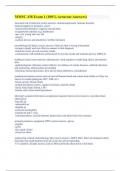
-
MMSC 438 Exam 1 (100% Accurate Answers)
- Exam (elaborations) • 21 pages • 2023
-
Available in package deal
-
- $12.59
- + learn more
increased risk of infection correct answers -immunosuppresion: immune disorder, immunosuppresive therapies, cancer -antimicrobial therapies: suppress normal biota -occupational exposure (e.g. healthcare) -age: very young and very old -surgery -medical devices and prosthetics: biofilm formation microbiology lab duties correct answers -find out what is wrong with patient -testing in timely and cost effective manner to find diagnosis -minimize errors, provide accurate results -communicat...
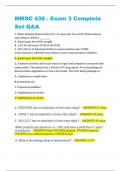
-
MMSC 438 - Exam 3 Complete Set Q&A
- Exam (elaborations) • 22 pages • 2023
-
- $10.99
- + learn more
MMSC 438 - Exam 3 Complete Set Q&A 1. When drawing blood cultures for a 5-year-old, the correct blood volume (according to ASM) is _______. A. Based upon the child's weight. B. 1 mL for each year of life of the child. C. 10 to 20 mL of blood per bottle to assure positive rate of 99%. D.Any volume is sufficient since blood is more concentrated in children. A. Based upon the child's weight. 2. A patient presents with acute onset of signs and symptoms consistent with endocarditis. Th...
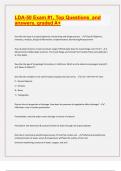
-
LDA-50 Exam #1, Top Questions and answers, graded A+
- Exam (elaborations) • 7 pages • 2023
-
Available in package deal
-
- $8.49
- + learn more
LDA-50 Exam #1, Top Questions and answers, graded A+ Describe the steps in a typical (generic) site planning and design process. - -Goal & Objective, Inventory, Analysis, Design & Alternatives, Implementation, Monitoring/Reassessment How do plate tectonics create mountain ranges? Which plate does the Coast Range come from? - -Movement & collided plate tectonics. The Coast Range are formed from Farallon Plate and subduction w. Kula plates Describe the age of the geologic formations in...
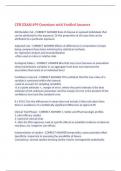
-
CPH EXAM 499 Questions with Verified Answers,100% CORRECT
- Exam (elaborations) • 62 pages • 2023
-
Available in package deal
-
- $14.49
- + learn more
CPH EXAM 499 Questions with Verified Answers Attributable risk - CORRECT ANSWER Rate of disease in exposed individuals that can be attributed to the exposure. Or the proportion of all cases that can be attributed to a particular exposure. Adjusted rate - CORRECT ANSWER Effects of differences in composition of pops being compared have been minimized by statistical methods. ex: regression analysis and strandardization -often used on rates or relative risks Ecological Fallacy - CORRECT ...
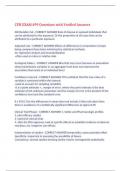
-
CPH EXAM 499 Questions with Verified Answers,100% CORRECT
- Exam (elaborations) • 62 pages • 2023
-
- $11.49
- + learn more
CPH EXAM 499 Questions with Verified Answers Attributable risk - CORRECT ANSWER Rate of disease in exposed individuals that can be attributed to the exposure. Or the proportion of all cases that can be attributed to a particular exposure. Adjusted rate - CORRECT ANSWER Effects of differences in composition of pops being compared have been minimized by statistical methods. ex: regression analysis and strandardization -often used on rates or relative risks Ecological Fallacy - CORRECT ...
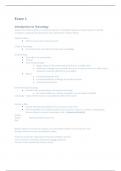
-
EFB400: EXAM 1 NOTES
- Class notes • 22 pages • 2023
-
- $20.49
- + learn more
Toxicology is an information heavy subject. However, the information conveyed are the daily problems we face in regards to public health. This one part class notes covers half of what would be covered in a semester long Introduction to Toxicology course. Studying these notes will guarantee an A in the class as it is heavily detail oriented but only provides the facts needed in the course to pass the exam. In addition, exam questions that might be asked on an exam are indicated. Topics covered ar...
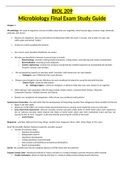
-
BIOL 209 Microbiology Final Exam Study Guide
- Exam (elaborations) • 60 pages • 2022
-
- $21.49
- + learn more
BIOL 209 Microbiology Final Exam Study Guide Chapter 1 Microbiology- the study of organisms, that are invisible unless they are magnified, which include algae, bacteria, fungi, helminths, protozoa, and viruses Bacteria are ubiquitous- they are everywhere including deep within the earth, in oceans, and on polar ice caps, and within plant and animal “bodies” Oceans are mostly populated by bacteria Our ocean’s most abundant inhabitants are viruses Microbes are beneficia...
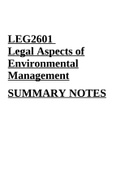
-
leg2601 legal aspects of environmental management summary_1.
- Summary • 41 pages • 2022
-
- $3.59
- + learn more
leg2601 legal aspects of environmental management summary_1.Learning Theme 1 – What is the law? 1.1 Introduction - The law is the basis of any orderly society - Moral and ethical rules that govern human behaviour are not usually legal rules. - Biblical/ religious commandments can constitute a legal norm e.g. thou shall not kill – murder is a crime and is the intentional act of killing a person without jurisdiction - Ethics: aka individual morality, comprise those guidelines that people...
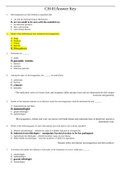
-
BIOL 2421: Microbiology final ocx, Latest 2020/2021 TEST BANK Guide, South Texas College.
- Exam (elaborations) • 483 pages • 2021
-
- $10.49
- 1x sold
- + learn more
BIOL 2421 Microbiology Final ocx. 1. Microorganisms are best defined as organisms that A. can only be found growing in laboratories. B. are too small to be seen with the unaided eye. C. are infectious particles. D. lack a cell nucleus. E. cause human disease. 2. Which of the following are not considered microorganisms? A. Fungi B. Protozoa C. Viruses D. Bacteria E. Mosquitoes 3. Helminths are ______. A. molds B. parasitic worms C. bacteria D. protozoa E. infectious particles 4. Among the types o...

That summary you just bought made someone very happy. Also get paid weekly? Sell your study resources on Stuvia! Discover all about earning on Stuvia


